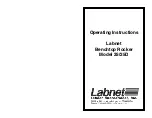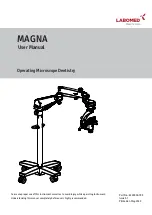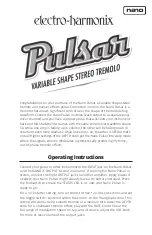
INSTRUCTIONS FOR THE SVT270B VACUUM TESTER
The Vacuum Tester checks the condition of vacuum operated diaphragms on or
off the vehicle. The dial face of the Tester gauge is calibrated in both inches and
millimeters of mercury (Hg) for applying the right amount of vacuum to test each
unit. The Release Valve allows you to adjust vacuum and release it when the check
is completed.
Always release vacuum to Tester before detaching tubing from
system.
The Tester is attached directly to the unit being tested, or to a tube leading
to it with special adapters and hose supplied with the Tester. When making
tests, make sure all connections are absolutely air tight.
Check and recheck the
connections.
Form a vacuum in the unit being tested by pumping the Tester until
the gauge indicates a vacuum. A leak in the unit or lines being tested will cause
the pointer on the Tester gauge to drop. In some tests a leak will be disclosed by
the movement or non-movement of the vacuum unit being tested. Most vacuum
units are non-repairable and must be replaced if found defective.
TROUBLESHOOTING
PROBLEM
SOLUTION
Gauge fails to return to
zero
Pump will not make
vacuum
Pump will not hold vacuum
The gauge has been damaged and needs to be replaced.
Vacuum is created by movement of the O-ring in the Piston
Assembly. If no vacuum is created replace the assembly as a
unit or the O-ring (#311) can be changed with some disassem-
bly work.
1. Check the vacuum release brass thumbscrew: Is it tight? Is
the O-ring present and in good condition?
2. Check the Pump Inner Valve: Unscrew the hose barb from
the front of the pump: Are the O-rings all in place and
clean? Clean and reassemble.
3. Are the parts assembled correctly? See diagram below for
correct order.
4. Check the gauge: Is a thread sealant present? Sometimes
the gauge itself can leak. After all other potential leaks are
fixed, change the gauge.
4
Содержание SVT270B
Страница 19: ...19 ...
Страница 20: ...FN SVT270B2016 ...





































